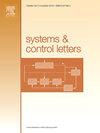On discrete-time bilinear systems: Constant disturbances enhancing controllability
IF 2.5
3区 计算机科学
Q3 AUTOMATION & CONTROL SYSTEMS
引用次数: 0
Abstract
Disturbances often influence the properties of control systems, which need to be avoided or dealt with by methods of, for instance, robust control and sliding mode control. Whether disturbances destroy controllability of control systems is an important issue. For linear systems, it can be proved that disturbances do not influence controllability. However, for nonlinear systems, it is shown in this paper that disturbances may not destroy controllability but may even enhance it. More specifically, discrete-time commutative bilinear systems are first considered, and it is proved that such uncontrollable systems can be controllable when disturbances appear in the dynamics. Algebraic as well as geometric criteria for controllability of the discrete-time commutative bilinear systems with disturbances are derived, which are both necessary and sufficient conditions. Moreover, an algorithm for computing the required control inputs to achieve state transitions is also proposed. Finally, controllability of general discrete-time bilinear systems with disturbances is studied, which further demonstrates our observation on disturbances enhancing controllability. Examples are provided to illustrate the obtained algebraic controllability criteria and algorithm.
关于离散双线性系统:恒定扰动增强可控性
干扰经常影响控制系统的性能,需要通过鲁棒控制和滑模控制等方法来避免或处理。扰动是否破坏控制系统的可控性是一个重要的问题。对于线性系统,可以证明扰动不影响其可控性。然而,对于非线性系统,本文表明,扰动可能不会破坏可控性,甚至可以增强可控性。更具体地说,首先考虑离散时间交换双线性系统,并证明了这种不可控系统在动力学中出现扰动时是可控的。导出了具有扰动的离散可交换双线性系统的可控性的代数判据和几何判据,它们既是可控性的充分必要条件,也是可控性的充分必要条件。此外,还提出了一种计算所需控制输入以实现状态转换的算法。最后,研究了一般具有扰动的离散双线性系统的可控性,进一步证明了扰动对可控性的增强作用。通过实例说明所得到的代数可控性准则和算法。
本文章由计算机程序翻译,如有差异,请以英文原文为准。
求助全文
约1分钟内获得全文
求助全文
来源期刊

Systems & Control Letters
工程技术-运筹学与管理科学
CiteScore
4.60
自引率
3.80%
发文量
144
审稿时长
6 months
期刊介绍:
Founded in 1981 by two of the pre-eminent control theorists, Roger Brockett and Jan Willems, Systems & Control Letters is one of the leading journals in the field of control theory. The aim of the journal is to allow dissemination of relatively concise but highly original contributions whose high initial quality enables a relatively rapid review process. All aspects of the fields of systems and control are covered, especially mathematically-oriented and theoretical papers that have a clear relevance to engineering, physical and biological sciences, and even economics. Application-oriented papers with sophisticated and rigorous mathematical elements are also welcome.
 求助内容:
求助内容: 应助结果提醒方式:
应助结果提醒方式:


